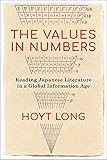The Values in Numbers : Reading Japanese Literature in a Global Information Age / Hoyt Long.
Material type: TextPublisher: New York, NY : Columbia University Press, [2021]Copyright date: ©2021Description: 1 online resource : 46 b&w charts, graphs, illustrations, and tablesContent type:
TextPublisher: New York, NY : Columbia University Press, [2021]Copyright date: ©2021Description: 1 online resource : 46 b&w charts, graphs, illustrations, and tablesContent type: - 9780231550345
- 410.285 23
- P98.5.S83 L66 2021
- online - DeGruyter
| Item type | Current library | Call number | URL | Status | Notes | Barcode | |
|---|---|---|---|---|---|---|---|
 eBook
eBook
|
Biblioteca "Angelicum" Pont. Univ. S.Tommaso d'Aquino Nuvola online | online - DeGruyter (Browse shelf(Opens below)) | Online access | Not for loan (Accesso limitato) | Accesso per gli utenti autorizzati / Access for authorized users | (dgr)9780231550345 |
Frontmatter -- Contents -- Introduction. Uncertainty in Numbers -- Chapter One. Facts and Difference -- Chapter Two. Archive and Sample -- Chapter Three. Genre and Repetition -- Chapter Four. Influence and Judgment -- Chapter Five. Discourse and Character -- Epilogue. Difference in Numbers -- Appendix -- Acknowledgments -- Notes -- Works Cited -- Index
restricted access online access with authorization star
http://purl.org/coar/access_right/c_16ec
Ideas about how to study and understand cultural history—particularly literature—are rapidly changing as new digital archives and tools for searching them become available. This is not the first information age, however, to challenge ideas about how and why we value literature and the role numbers might play in this process. The Values in Numbers tells the longer history of this evolving global conversation from the perspective of Japan and maps its potential futures for the study of Japanese literature and world literature more broadly.Hoyt Long offers both a reinterpretation of modern Japanese literature through computational methods and an introduction to the history, theory, and practice of looking at literature through numbers. He weaves explanations of these methods and their application to literature together with critical reflection on the kinds of reasoning such methodologies facilitate. Chapters guide readers through increasingly complex techniques while making novel arguments about topics of fundamental concern, including the role of quantitative thinking in Japanese literary criticism; the canonization of modern literature in print and digital media; the rise of psychological fiction as a genre; the transnational circulation of modernist forms; and discourses of race under empire. Long models how computational methods can be applied outside English-language contexts and to languages written in non-Latin scripts. Drawing from fields as diverse as the history of science, book history, world literature, and critical race theory, this book demonstrates the value of numbers in literary study and the values literary critics can bring to the reading of difference in numbers.
Mode of access: Internet via World Wide Web.
In English.
Description based on online resource; title from PDF title page (publisher's Web site, viewed 01. Dez 2022)


